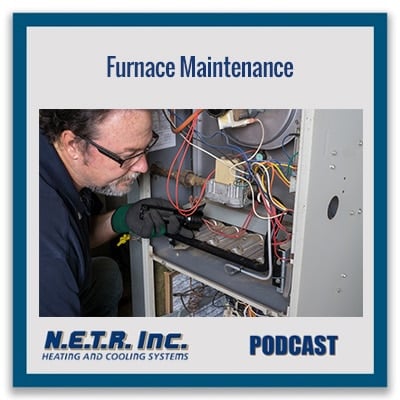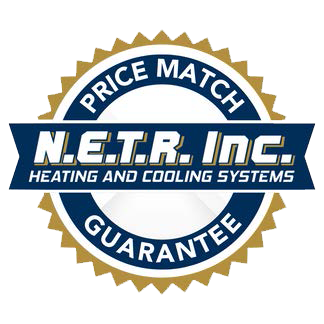
Mike Cappuccio, owner of N.E.T.R. Inc., a heating and cooling company based in Massachusetts, discusses furnace maintenance.
Mike Cappuccio, owner of N.E.T.R. Inc., a heating and cooling company based in Massachusetts, discusses furnace maintenance.
John Maher: Hi, I’m John Maher, and I’m here today with Mike Cappuccio, owner of N.E.T.R. Inc., a heating and cooling company in Massachusetts. Today, we’re talking about furnace maintenance. Welcome, Mike.
Mike Cappuccio: Good afternoon, John. How are you?
Do Furnaces Require Regular Maintenance?
John: Good, thanks. So Mike, do furnaces require regular maintenance in order for them to run properly?
Mike: Yes they do, John. They definitely do. We recommend that at the beginning of the season, you have your furnace checked. Again, when does your furnace not work? When do you really find out it doesn’t work? First time you turn it on.
John: Right. One of those first cold days in the fall or something like that.
Mike: Yeah. Yeah, I actually had one this morning, as a matter of fact.
John: Yeah.
Mike: I almost turned the furnace on, but I did not. I said, “You know what? Let me get a blanket instead.”
John: Yeah, pull on a sweater.
Mike: Yeah, exactly. Yeah, I wasn’t going to quite turn the furnace on this morning. Regular maintenance is key to making sure that your furnace is going to work properly at the beginning of the season and throughout the whole season.
How Often Do Furnaces Need Maintenance?
John: So how often do furnaces need maintenance work? And when do you recommend that that gets done?
Mike: We recommend furnace maintenance gets done once a year, usually right around the fall, end of September, beginning of October, maybe mid-October. Coming out, replacing the filter, cleaning the burners, checking the burners; making sure that if you have any type of power exhaust or anything like that, that it’s clean and free of birds’ nests and squirrels and things that could have gone into that thing from the summer and in the spring and things like that. Make sure that those motors are working, that they’re lubricated properly. Once a year, you’ve got to get out and make sure the burners are clean. There’s all different types of furnaces that require different types of maintenance.
John: Is there anything that needs to be done at the end of the season, after the winter, and as you’re shutting off the system, basically, for the summer? I mean, most furnaces also probably do hot water, so they’re running year round. But is there anything that needs to be done in the spring?
Mike: Not really, John, from a springtime perspective with a furnace. Most of that that’s going to produce that water is going to come from a boiler, not really a hot air furnace, so that is going to run most of the time. So if you’ve done this in the fall, this should get you into the spring and summer months if you are using a boiler to create that hot water. But with a hot air furnace, you have duct work in the house and you’re pushing air through the vents, at the end of the spring, it’s more just turn it off and let’s get into air conditioning mode for late spring and do what we need to do to get maintenance done for air conditioning at that point.
Regular Furnace Maintenance and Energy Efficiency
John: Right. Well, to talk about energy efficiency. Does regular maintenance being done on a furnace cut down on buildup and things like that, that might cause my energy bills to go up?
Mike: Absolutely. First thing is just filtration, John. I think I said in an earlier podcast, I’ve seen filters … Most of the time, people don’t know that there’s a filter actually inside of the furnace sometimes. Sometimes people just have a filter in the grill and it might be in a ceiling of a second floor, or it might be in a grill of a wall or something like that. And they think that that’s the only filter that’s in the system. I can’t tell you how many times we go out and we find two filters in a system where people are like, “Oh, yeah. I have been changing the filter every year. The filter’s clean.” And then you’re like, “No, wait a minute. What about this filter?” “Oh, I didn’t even know I had this filter in there, and it’s been blocked for the past three or four years.”
That’s just allowing your furnace to run at 50% of the capacity, and it’s just running all the time, wasting all that gas or oil or propane, whatever you’re heating with. Because you’re not being able to pull the cold air over that warm coil properly, because it’s all blocked at that point. The burners are then going to start to crud up, too, because you’re not getting the right amount of air flow over them, so they’re going to end up getting all black. They’re going to get all sooted. It’s something that you need to make sure that your furnace is operating properly. I mean, just a properly running furnace, you can save 50% sometimes on your use of gas or oil just having it run properly.
Regular Furnace Maintenance and Cost Savings
John: Right. What about repair costs? If I’m getting regular maintenance done, am I much less likely to see catastrophic problems or things failing that might require a major repair bill?
Mike: Yes. I mean, with maintenance, John, just lubricating motors and things like that, it’s amazing how far a drop of oil can go. I’m not kidding you. As far as just putting a drop of oil into an electric motor and a draft-induced motor or a blower motor that is the air that’s moving, because when those motors get all dried up, that’s how they fail. Those motors are 4, $500 every time you change them. I mean, a drop of oil is pennies. Just that maintenance alone, just on that you can keep the motors running for years just by proper lubrication and not being able to have those costly repairs. I mean, again, a secondary filter that’s in there, that might not be bad, a pump. A lot of these 98% efficient furnaces now, they all have a condensate pump.
So you’re draining water. There’s water coming out of the furnace. It’s going through, usually, a type of filter now because you can’t have that water being pumped into a sewer-type thing without having it being filtered before it can actually get pumped out, so there’s filters that need to be changed. The desiccant in there needs to get replaced. Condensate pumps get all crudded up and dirty if you’re not washing and cleaning them on a regular basis and maintaining the pumps. Most pumps never get maintained, and the reason why they go is they’re just full of dirt and crud and algae and everything. A regular maintenance, you could change a $75 condensate pump on a maintenance, a service call, that could cost you $300.
Keeping things clean and running efficient and properly really saves a lot of money on your heating bills, because it’s not really a lot to a furnace. I mean, it’s really just gas is being ignited. It’s keeping a warm heat exchanger warm and you’re just running cold air over a warm surface is all you’re doing. You’ve really got to keep fans operating properly, and if it’s going into a chimney, you want to make sure your chimney is clean. You want to make sure the chimney is kept clean if that’s how you are venting your system. If you’re not venting it into a chimney and you’re venting it outside, you want to make sure that, like I said, those vents are clean, they’re not blocked up, things like that on a regular maintenance that you’re making sure are all good.
John: All right. That’s great advice, Mike. Thanks again for speaking with me today.
Mike: Thanks, John.
John: And for more information, you can visit the N.E.T.R. website at www.netrinc.com. Or call 781-933-NETR. That’s 781-933-6387.
